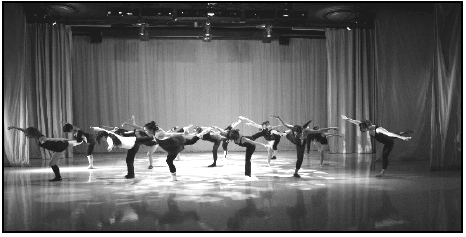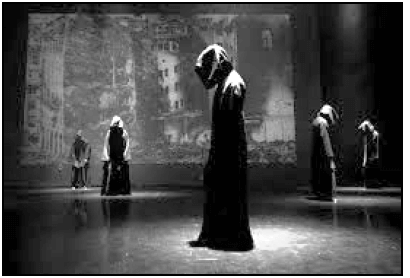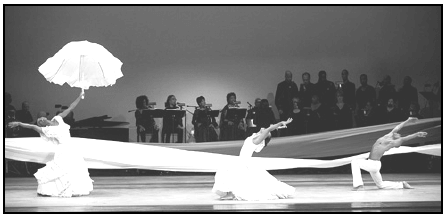DANCE STUDIES GRADE 12 QUESTIONS - NSC PAST PAPERS AND MEMOS NOVEMBER 2016
Share via Whatsapp Join our WhatsApp Group Join our Telegram GroupDANCE STUDIES
GRADE 12
NATIONAL SENIOR CERTIFICATE
NOVEMBER 2016
INSTRUCTIONS AND INFORMATION
- This question paper consists of TWO sections with ELEVEN questions in total. Answer only SIX questions as follows:
SECTION A: SAFE DANCE PRACTICE AND HEALTHCARE (40 marks)
Consists of FIVE questions of which THREE must be answered as follows:- QUESTION 1 is COMPULSORY.
- You have a choice between QUESTION 2 and QUESTION 3 and a choice between QUESTION 4 and QUESTION 5. If you answer both questions in each case, only the FIRST answer in each case will be marked.
SECTION B: DANCE HISTORY AND LITERACY (60 marks)
Consists of SIX questions of which THREE must be answered as follows: - QUESTION 6 and QUESTION 7 are COMPULSORY.
- You have a choice between QUESTION 8, QUESTION 9, QUESTION 10 and QUESTION 11. If you answer more than one of the four choice questions, only the FIRST answer will be marked.
- Number the answers correctly according to the numbering system used in this question paper.
- Read each question carefully and take note of what is required.
- NOTE: If you are requested to explain/elaborate/describe/analyse/ evaluate/compare, write your answer in full sentences and give as much information as possible. One-word answers will NOT be accepted.
- You may do rough planning in the ANSWER BOOK. Draw a line through any work that should NOT be marked.
- You will be assessed on your ability to:
- Use good English (write only in one language)
- Organise and communicate information clearly
- Use the specific format asked for in certain questions
- Use specialist dance terminology where appropriate
- Write neatly and legibly.
SECTION A: SAFE DANCE PRACTICE AND HEALTHCARE
QUESTION 1: DANCE CONVENTIONS AND VALUES (COMPULSORY)
Write a speech for a Grade 9 parents' meeting to explain the value of Dance Studies as a subject. Use examples from your personal experience.
Explain how the values and conventions learnt in Dance Studies may assist you in future employment opportunities. [10]
NOTE: You have a choice between QUESTION 2 and QUESTION 3.
Answer only ONE of these questions.
QUESTION 2: SAFE DANCE PRACTICE
It is very important for a dancer to implement safe dance practice during dance classes and in examinations.(6)
2.1 Describe THREE safe dance practices a dancer may apply that will prevent an injury occurring before or during a dance examination.
2.2 Presentation and dance quality form an important part of a dance examination.(6)
Elaborate on SIX ideas that will ensure that your dance technique demonstrates performance quality.
2.3Name TWO essential components of your diet and explain how they may enhance your health and your dance ability.(4)
[16]
OR
QUESTION 3: MUSCLES, JOINT ACTIONS AND TREATMENT OF INJURIES

3.1Study the photographs above and name any THREE muscles responsible for moving the hip joint.(3)
3.2Explain ONE anatomical action involved in the movement occurring in the hip joint in the photographs above.(1)
3.3Besides the action explained in QUESTION 3.2 above, name TWO other anatomical actions that are possible in the hip joint.(2)
3.4Name the anatomical action that is occurring in the ankles in photographs B and C.(1)
3.5Which THREE muscles would be involved in this action (in B and C)?(3)
3.6What could a dancer do to aid recovery after a muscle strain? Recommend at least THREE options and clearly describe the benefits of each one.(6)
[16]
NOTE: You have a choice between QUESTION 4 and QUESTION 5.
Answer only ONE of these questions.
QUESTION 4: NEUROMUSCULAR SKILLS AND INJURIES

The images above represent the neuromuscular system. Give the following information:
4.1 Define neuromuscular skills clearly. (2)
4.2 Explain any THREE of the following neuromuscular skills and elaborate on how they enhance dance performance:
4.2.1 Agility
4.2.2 Kinaesthetic awareness
4.2.3 Spatial awareness
4.2.4 Reactivity (3 x 2) (6)
4.3 Explain how a dancer may develop musicality. (2)
4.4 Choose ONE of the following factors and describe how it may contribute to the prevention of injuries:
4.4.1 A good teacher (2)
4.4.2 The correct dance environment (2)
[14]
OR
QUESTION 5: FLEXIBILITY AND INJURIES

Flexibility is a vital component of fitness in a dancer's training and performance.
5.1 Describe FOUR factors that may limit a dancer's flexibility. Do NOT give one-word answers.(4)
5.2 Analyse FOUR benefits of a good level of flexibility that may contribute to a dancer's performance.(4)
5.3 Indicate THREE essential do-rules and THREE essential don't-rules that a dancer should follow in his/her stretching programme. Explain the reasons for each rule.(6)
[14]
TOTAL SECTION A: 40
SECTION B: DANCE HISTORY AND LITERACY
QUESTION 6: DANCE FORMS, CHARACTERISTICS AND PRINCIPLES (COMPULSORY)
All dance forms emerge from particular cultures, environments and periods. They have specific recognisable characteristics and principles.
6.1 Name TWO dance forms you have studied. Identify and describe FOUR recognisable characteristics and/or principles of each of these dance forms. Do NOT provide one-word answers. (4 x 2) (8)
6.2 Fusing different dance forms and dance styles has become increasingly popular among choreographers and dancers.
6.2.1 Name ONE prescribed dance work that you have studied and identify the dance styles or forms that have been fused.(3)
6.2.2 Discuss the positive and/or negative implications of dance fusion.(4)
[15]
QUESTION 7: DANCE PERFORMANCE SPACES AND DANCE CAREERS (COMPULSORY)
Artists are increasingly exploring different types of performance spaces in which to present or film their dance works. Use the photographs below to inspire you.


7.1 How may conventional and non-conventional performance spaces influence the choreography of a dance work? Write an essay describing different performance spaces and explain how you would use them in your choreography.(12)
7.2 Name and describe ONE dance-related career in a conventional theatre and the role it plays in the overall production. (3)
[15]
NOTE: You have a choice between QUESTION 8, QUESTION 9, QUESTION 10 and QUESTION 11.
Answer only ONE of these questions.
QUESTION 8: GREGORY MAQOMA AND FOUR SEASONS
8.1 Gregory Maqoma's dance work Four Seasons conveys a number of important messages to the audience. Elaborate on these messages. (10)
8.2 Study the photograph below of a scene in this dance work. Analyse the symbolic meaning of the season being portrayed and how the choreographer achieved this.
 (10)
(10)
8.3 Review Gregory Maqoma's contribution to the development of dance in South Africa. (10)
[30]
OR
QUESTION 9: ALVIN AILEY AND REVELATIONS
9.1 Study the photograph below and identify the section that is being portrayed. Explain in detail how the choreographer used symbolism in this section.
 (10)
(10)
9.2 Elaborate on how the themes of Pilgrims of Sorrow and Move Members Move are depicted through movement, music and production elements. Give examples from these sections to support your answer. (10)
9.3 Discuss the important experiences and influences in Alvin Ailey's life and dance career that shaped him as a choreographer. (10)
[30]
OR
QUESTION 10: CHRISTOPHER BRUCE AND GHOST DANCES
| Bruce was asked in an interview with Stuart Sweeny why he included human rights themes in his work, particularly since there is a view that the arts should only be concerned with creating beauty. |
10.1 How do you think Christopher Bruce would have answered the question above with regard to why he choreographed Ghost Dances?(2)
10.2 What events motivated Christopher Bruce to choreograph Ghost Dancers?(4)
10.3 Elaborate on how Bruce used the production elements, music and movement vocabulary to build the characterisation and atmosphere of the following:
10.3.1 The Ghosts(8)
10.3.2 The Dead (villagers) (8)
10.4 Select important background information on Christopher Bruce's professional career as a choreographer that may be included in a programme note. (8)
[30]
OR
QUESTION 11: CHOREOGRAPHERS AND DANCE WORKS
Answer this question by referring to any TWO of the prescribed choreographers below.
| INTERNATIONAL CHOREOGRAPHERS | DANCE WORKS |
| Alvin Ailey | Revelations |
| Christopher Bruce | Ghost Dances |
| George Balanchine | Apollo/Jewels (Emeralds, Rubies, Diamonds) |
| Jiri Kylian | Wings of Wax/Stamping Ground |
| Martha Graham | Lamentation/Errand into the Maze |
| Matthew Bourne | Swan Lake/Cinderella |
| Mats Ek | Giselle/Swan Lake/Carmen |
| Pina Bausch | The Rite of Spring |
| Rudi van Dantzig | Four Last Songs |
| William Forsythe | In the Middle, Somewhat Elevated |
| SOUTH AFRICAN CHOREOGRAPHERS | DANCE WORKS |
| Alfred Hinkel | Cargo/I am Cinnamon/Rain in a Dead Man's Footprints/Bolero/Last Dance |
| Carolyn Holden | Blood Wedding/Imagenes |
| Dada Masilo | Swan Lake/Romeo and Juliet |
| Gary Gordon | Bessie's Head |
| Gregory Maqoma | Four Seasons/Skeleton Dry |
| Mavis Becker | Flamenco de Africa |
| Sylvia Glasser | Tranceformations |
| Veronica Paeper | Orpheus in the Underworld/Carmen |
| Vincent Mantsoe | Gula Matari |
11.1 Give the names of the TWO choreographers and each dance work that you chose.
11.2 Give biographical information on the TWO choreographers who you referred to in QUESTION 11.1 and explain their different backgrounds and training.
(5 x 2)(10)
11.3 Use the movement vocabulary and production elements to explain how the TWO choreographers that you named in QUESTION 11.1, communicated the themes of their dance works. Elaborate and give examples. (5 x 2)(10)
11.4 Considering all the prescribed works that you have studied, give your opinion of the ONE you enjoyed most and the impact it had on you.
Motivate your choice by supporting your answer with specific examples. Remember to name the choreographer and the dance work you are referring to. (10)
[30]
TOTAL SECTION B: 60
GRAND TOTAL: 100